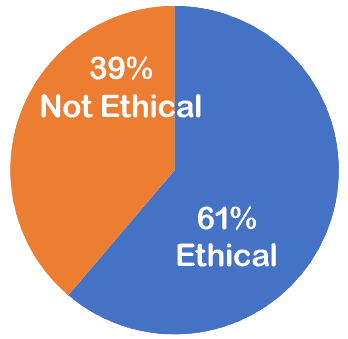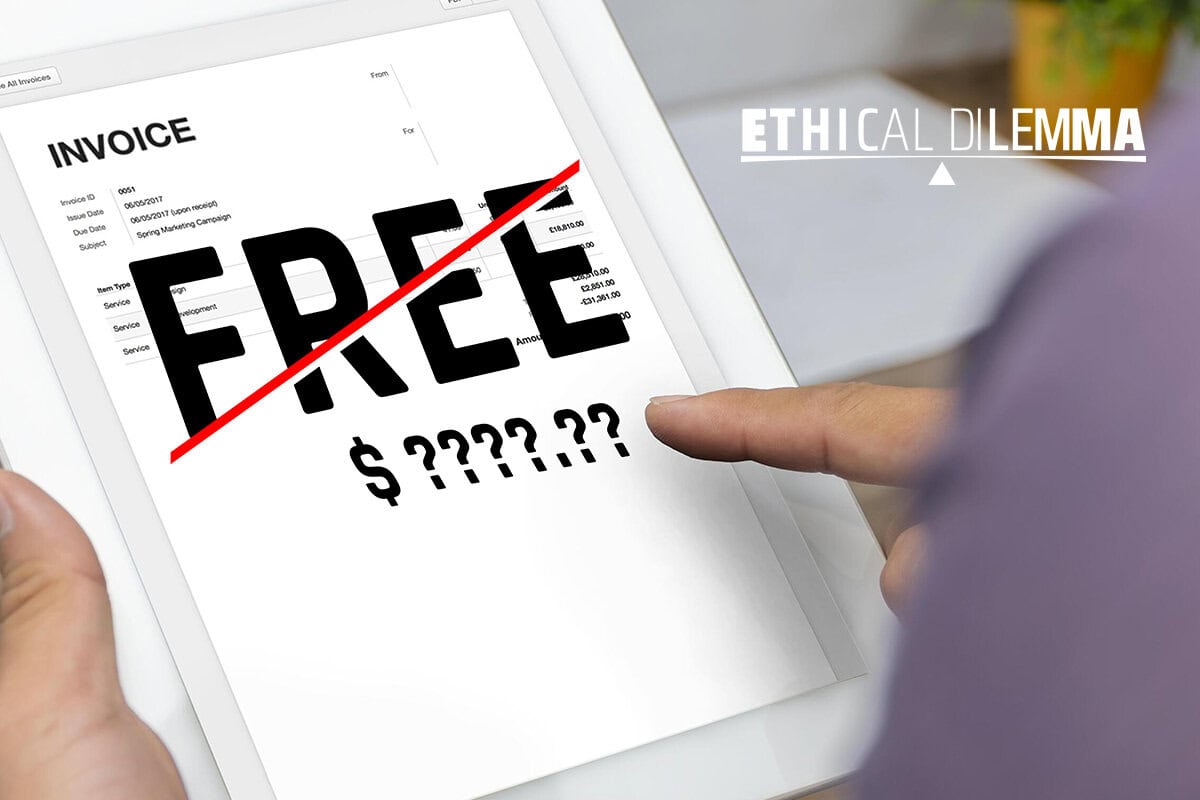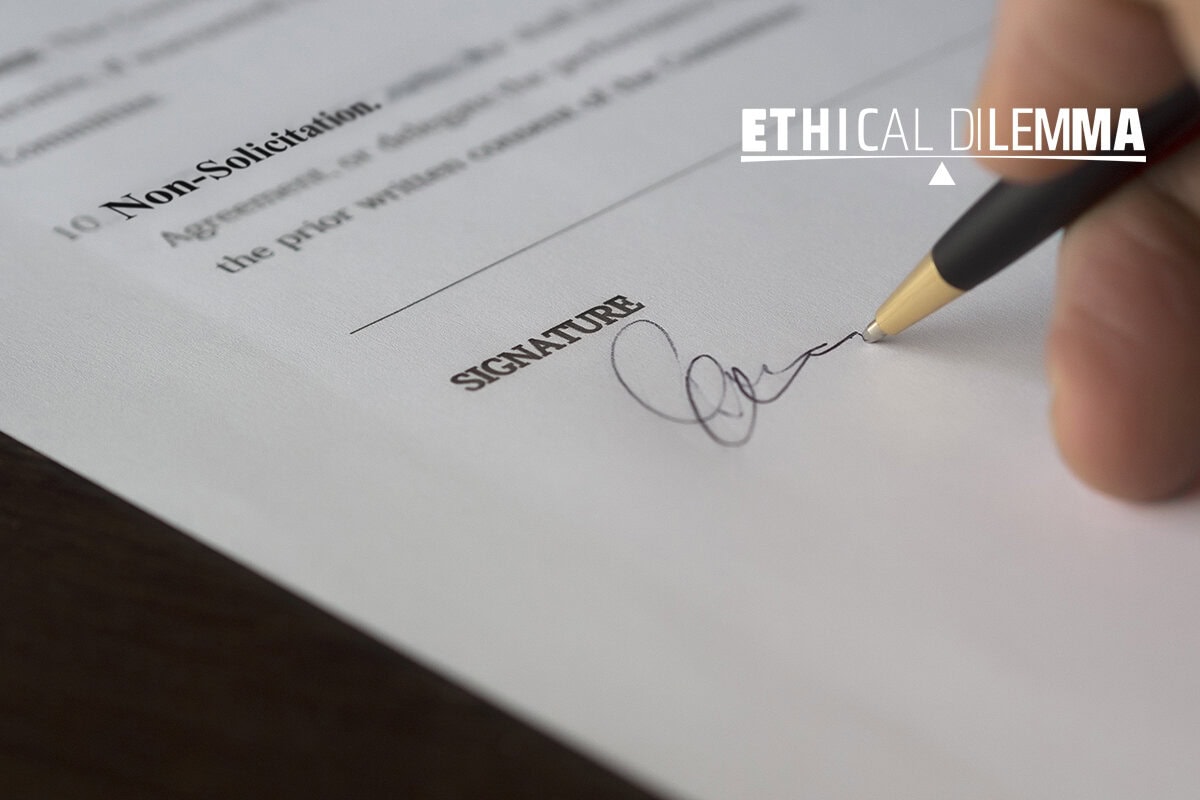This is the April 2023 edition of our monthly series of Ethics case studies titled What Do You Think? This series is comprised of case studies from NSPE archives, involving both real and hypothetical matters submitted by engineers, public officials and members of the public.
Your peers and the NSPE Board of Ethical Review have reviewed the facts of the case as shown below. And, here are the results.
Your opinion has been registered for the April 2023 edition of our monthly series of Ethics case studies titled What Do You Think?
Your vote is recorded as:

Want to know how your peers voted? We’ll send you an email with the poll results on April 25.
Your opinion has been registered for the April 2023 edition of our monthly series of Ethics case studies titled What Do You Think?
Your vote is recorded as:

Want to know how your peers voted? We’ll send you an email with the poll results on April 25.
A Review of the Facts
Engineer Wally performed design services for a client and also agreed to perform inspection services during the construction phase of the project. Owing to factors beyond the control of the client, work does not proceed to the construction phase, and therefore, Wally does not perform inspection services.
The client pays Wally what the client believes constitutes just compensation for the design services rendered. Wally disagrees with the client’s determination, stating it is arbitrary. After a period of negotiation, Wally brings a suit against the client for additional compensation under the terms of the contract.
Two years later while the litigation is pending, the client decides to proceed with the project to completion, contacts Engineer Jerry and asks Jerry to review and modify the plans and specifications of the work product developed by Wally. Jerry agrees to perform the services for the client.
What Do You Think?
Was it ethical for Jerry to agree to perform review and modification services for the client while the issue of compensation for Wally was being litigated?
Here is the result of our survey of your peers:

Applicable NSPE Code References:
III.7.a
Engineers in private practice shall not review the work of another engineer for the same client, except with the knowledge of such engineer, or unless the connection of such engineer with the work has been terminated.
Discussion
The facts of this case are similar to a previous case decided by the Board. In Case 79-7, where an engineer was asked to inspect mechanical and electrical engineering work performed seven years earlier, the Board concluded that the engineer was not unethical in taking the assignment and in rendering the report to the owner.
In that case, the Board noted that the engineer notified the former engineer that the engineer was being retained to perform review and inspection services and that the review would entail a review of the original designs. The Board said: “It may be helpful for future guidance to again point out that the purpose of Code 12(a) (now Code III.7.a) is to provide the engineer whose work is being reviewed by another engineer an opportunity to submit … comments or explanation for … technical decision, thereby enabling the reviewing engineer to have the benefit of a fuller understanding of the technical considerations in the original design in framing . . . comments or suggestions for the ultimate benefit of the client.” Although the Code of Ethics has been amended in several aspects, we have no trouble in concluding that Case 79-7 is still a proper interpretation of the Code.
However, as is apparent from a reading of the facts in the present case, unlike Case 79-7, Jerry did not give Wally notice of the fact that Jerry would be retained to perform review and inspection services for the client. In addition, there is nothing to indicate in the facts that Wally knew or had any reason to know that Jerry agreed to perform those services for the client. Therefore, in order to decide if Jerry’s actions conformed to the Code of Ethics, the Board must determine that Wally’s connection with the client’s work had been terminated.
Aside from any contractual obligations which may remain between the owner and the engineer, which may be settled by mutual agreement or as here by recourse to legal proceedings, it has long been held that the owner has a right to terminate the services of the engineer at the owner’s pleasure. The Code of Ethics makes it absolutely clear that the engineer is to act as a faithful agent or trustee in dealings with the client and as such serves at the full discretion of the client.
Even should the owner’s decision be based upon whim, caprice, or unsound motivation, it does not alter the owner’s right to have the engineer of choice. Nevertheless, there is also little doubt that an engineer is entitled to just compensation for services rendered and engineers have an ethical obligation to see to it that in competing with other engineers, their actions do not in any way impede or interfere with the ability of another engineer to be justly compensated.
Under the facts presented in this case it is arguable that the actions of Jerry. in agreeing to perform services for the client, may have interfered with Wally’s ability to perform under the terms of the agreement that Wally negotiated with the client. For example, had Jerry not agreed to perform the services as described above, Wally may have been able to negotiate a settlement in his dispute with the client using future inspection and other services as a “bargaining chip” in the negotiations.
In addition, it is possible that a court could require the owner to specifically perform the terms of the original contract between owner and Wally. However, such an argument is highly speculative and probably does not accurately reflect the realities of the situation. In most, if not all cases such as here, once a client is sued by an engineer, the relationship is irreparably damaged and no chance exists for a reconciliation. The relationship between the owner and the engineer is founded upon trust and loyalty and once the parties enter into litigation, each naturally views the other as an adversary. Therefore, it is the view of the Board that Jerry’s agreement to perform services for the client did not constitute unfair competition with Wally or interfere with Wally’s ability to be justly compensated.
Nevertheless, a question still remains which must be addressed: Had Wally’s connection with the client in fact been terminated? Litigation, although a proceeding intended to settle pending claims, must be considered evidence of the termination of a relationship. Were it to be viewed otherwise, both engineer and client would be considered to have an ongoing relationship long after the possibility of any reconciliation had expired. Based upon the above discussion, there is little doubt that such a termination had occurred.
Although some uncertainty exists as a result of the litigation between Wally and the owner, the Board feels compelled to discuss the issues presented in the most realistic light possible. Certainly a possibility always exists that an owner may rekindle his relationship with an engineer with which he formerly dealt. But a severance must be found at some point so that another engineer interested in performing services for a client may ethically proceed. We are convinced that litigation is clear enough severance and therefore find that Jerry acted ethically when he agreed to perform review and modification services for the client even though Wally was engaged in litigation with the client.
The Ethical Review Board’s Conclusion

It was ethical to agree to perform review and modification services for the client while the issue of compensation for Wally was being litigated between Wally and the client.
BOARD OF ETHICAL REVIEW
Wendell Beard, P.E., Ernest C. James, P.E., Robert W. Jarvis, P.E., Lawrence E. Jones, P.E., James L. Polk, P.E., J. Kent Roberts, P.E., Alfred H. Samborn, P.E., chairman
Note – In regard to the question of application of the Code to corporations vis-a-vis real persons, business form or type should not negate nor influence conformance of individuals to the Code. The Code deals with professional services, which services must be performed by real persons. Real persons in turn establish and implement policies within business structures. The Code is clearly written to apply to the Engineer and it is incumbent on a member of NSPE to endeavor to live up to its provisions. This applies to all pertinent sections of the Code. This opinion is based on data submitted to the Board of Ethical Review and does not necessarily represent all of the pertinent facts when applied to a specific case. This opinion is for educational purposes only and should not be construed as expressing any opinion on the ethics of specific individuals. This opinion may be reprinted without further permission, provided that this statement is included before or after the text of the case.









We don’t know for certain whether or not Wally was terminated because it is not specifically stated. Due to the passage of time and the fact that an acrimonious situation occurred between Wally and the client, it is presumed that any working relationship could exist.
The fact that a significant amount of timae had passed, it is logical the the plans should be reviewed and altered to meet current conditions. Also, the decision by the court would indicated that adequate compensation would be issued to Wally.
That should read “it is presumed that any working relationship could NOT exist.
I disagree with the conclusion. I was involved with a similar case some years back. The client was being sued for non-payment of work performed. He then went to another firm we were made aware of by the municipal engineer as we found out the plans provided by our office had been filed by another engineering firm with our title block and signature. The new engineering firm was notified by our office that the developer had not paid the invoice and being sued by our office but also the replacement engineer would need to remove our title block and replace with their own. as they would need to take liability for what was on the drawings. Hearing this the replacement engineer contacted the developer and stated they would not accept the offer as they would not accept liability for someone else’s work and concern that this may go to the state Board of Engineers and found to be fined for signing nsomeone else’s work and design.
Given the limited information I would consider this ethical. Jerry has nothing to do with the dispute between Wally and the client. Since two years went by, the client could be simply paying Jerry to update /check Wally’s design.
Beyond the Ethical / Unethical decision, this is more of a case of the wisdom of accepting a project in which there is a known ongoing dispute between an original Engineer (Wally) and the Client, presumably over the constructibility of Wally’s design. Jerry should assume that independent of his design work, he will be drawn into that litigation by one or both parties. The litigation could involve significant time associated with Reports, Depositions, and possibly testimony in Court, Arbitration or Mediation. An Engineer should be Ethical, but also wise. Jerry should walk away from this one unless the Client agrees in advance to compensate him separately for all fees and expenses associated with the litigation.
Although it is not mentioned in the facts about the case whether Jerry had communications with Wally, it would be necessary that Jerry either notify Wally that he was being asked to review and modify the plans and specifications that Wally prepared, or confirm that Wally’s connection with the work had been terminated, in accordance with NSPE Code of Ethics for Engineers, III.7.a.
“Engineers in private practice shall not review the work of another engineer for the same client, except with the knowledge of such engineer, or unless the connection of such engineer with the work has been terminated.”
Many states have similar rules in the statutes regarding notifying the original engineer before reviewing or modifying their work product.
I agree. Even if ethical, this is not the kind of business that I want.
The second engineer should at the least contact the first engineer to ascertain if he has been terminated, if there are unique aspects of the design that may warrant consideration, and if the first engineer objects to the second engineer taking over the job. I once began a take-off on a set of plans for a cost estimate, found something I questioned, contacted the design engineer, who was horrified that someone was proceeding with plans that were incomplete because his work had been stopped prior to finishing.
This execise was somewhat in vain as the information provided was limited. There are too many questions unanswered that need to be answered regarding everyone’s knowledge to actually provide a resonable anwser.
I need to agree. This has nothing to do with litigation but everything to do with signing off on someone else’s work who was unsupervised by the signer.
The underlying code sounds like it’s based on protectionism, restraint of trade, and in violation of anti-trust rules.
Switching to another domain, isn’t this akin to preventing a patient from seeking a second opinion without the first doctor’s approval?
Were I the customer, I should like the ability to freely hire additional engineers any time i want. It’s my dime. And I’d consider any professional guild blocking that to infringe on my ability to choose.
It appears the code would greatly inhibit my ability to hire a second opinion should I find the first engineer is arrogant and I suspect they have not delivered the care and competence I paid for. Why should I as a customer be held hostage until the hired professionals sort it out?
Absent some contract provision to the contrary, the client can generally terminate the services of a design professional at any time – the only open question in that event is the payment due for the services provided. That obligation would remain regardless if the client later elects to finish the project with another designer.
The example is unclear as to whether the first designer had actually completed the design – as evidenced by his seal and signature. If the work was arguably incomplete (i.e. ,unsigned), then the replacement designer assumes full liability for the complete design. If it was signed the replacement designer should remove the original designer’s signature and seal from the documents and replace them with his own.
The example also does not state that any error or other defect was found in the original design and that the replacement designer made “modifications” to the design documents (presumably at the client’s request). Thus it arguably became a “new” project entirely and the original designer had no residual liability – but still was entitled to be paid fairly for what he did.
Besides needing to notify Wally, if Jerry modified the design, then he would need to take the prescribed steps to be able to say that he is now the engineer in responsible charge. Every state has rules that define “responsible charge”, and it could differ from state to state. In my state, Jerry would have needed to take steps to produce all the drawings under his charge; he would not be allowed to stamp drawings that Wally prepared.
I disagree. First Jerry hasn’t contacted Wally regarding this review. In the absence of a statement to the contrary, we can take this as fact. That’s a potential violation of III.7.a. What if the client attempts to leverage Jerry’s review to denigrate Wally’s original design and thereby put Wally at a disadvantage on the legal side of things?
Again I completely disagree with your conclusion. If you said Jerry was to just review and make comments I would agree it was ethical but once you added modify it changed to being unethical. Now if you added that Wally’s title block, signature and seal was removed and Jerry puts his title block, signature and seal on the drawings and resubmitted to the municipality for approval I may agree. Then it also allows Wally to bring Jerry before the board to determine if Jerry infringed on the design of Wally.